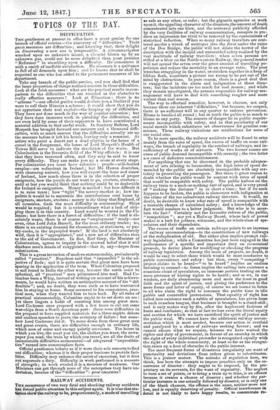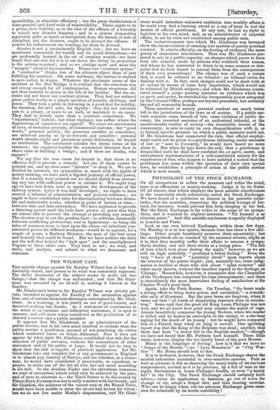RAILWAY ACCIDENTS.
Tun occurrence of two very fatal and shocking railway accidents has forced public attention to this subject again. It is true that sta- tistics show the railway to be, proportionately, a mode of travelling
as safe as any other, or safer ; but the gigantic agencies at work upon it, the appalling character of the disasters, the amount of death concentrated into one blow, and the universal publicity afforded by the very facilities of railway communication, conspire to pro- duce an impression too vivid to be removed by the consolations of statistical reflection. When so many railway travellers are scat- tered amidst a wreck of carriages into the river under the ruins of the Dee Bridge, the public will not dilute the horror of the description with the insipid and unrecorded safety realized by the vast multitude of railway travellers : when seven persons are stifled at a blow on the North-western Railway, the general reader will not spread the seven over the gross amount of travelling po- pulation and reduce the mortality to an average ratio. The poor wretches struggling in the water, or stricken together in a heap of lifeless flesh, constitute a picture too strong to be put out of the mind by abstractions. In pure reason, there is a good deal that is exaggerated in the alarm and indignation at these disas- ters; but the incidents are too much for cool reason ; and while they remain unmitigated, the persons responsible for railway ma- nagement will have to deal with something rougher and more violent than cool reason.
The way to effectual remedies, however, is obscure, not only because there are inherent " difficulties," but because, we suspect, there is no sufficient will in any quarter to enforce prevention. Blame is bandied all round ; but in truth the public is as much to blame as any party. The sources of danger lie in public require- ments incompatible with safety, and in that peculiarity of our social morals which substitutes set observances for genuine con- science. These railway visitations are retributions for some of our social sins.
To be more specific, the railway accidents will be found to arise mainly from the rates of speed, the excess of traffic on some rail- ways, the breach of regularity in the conduct of railways, and in- sufficiency of works or of servants. The two former causes are cases of public demand incompatible with security ; the two latter are cases of defective conscientiousness.
For anything that can be discerned in the probable advance.. ment of arts relating to locomotion, the high rates of speed de- manded by the public are absolutely incompatible with any cer- tainty in preserving the passengers. But there is great reason to doubt whether the public would be content with rates of speed that would be compatible with safety. The public halloos on the railway train to a neck-or-nothing rate of speed, and is very proud of " making the distance" in so short a time ; but if its neck happens to be broken, the public is clamorous with indignation at the crime of the too subservient railway directors. It would, no doubt, be desirable to know what rate of speed is compatible with a tolerable chance of calculated safety ; and a knowledge of the fact would conduce to a better judgment. But who is to ascer- tain the fact ? Certainly not the favourite referee of the public, " competition "; nor yet a Railway Board, whose lack of power makes it a butt for jobbers, witnesses, and the whole class of spe- culators and their dependents. The excess of traffic on certain railways points to an increase of railway accommodation—to the construction of new railway's or the reduplication of old. But either plan implies prompt rail- way legislation ; while a Committee has just been engaged in the performance of a specific and important duty on economical grounds, to devise plans for modifying or checking the pr e of railway legislation. Among the mass of projects, no doTgrt, progress of be easy to select those which would be most conducive to public convenience and safety : but then, every " competing " project claims to be heard—" to be heard" implies an endless listening to counsel—to listen implies the calling into existence a countless cloud of speculators, an immense portion trading on the mere pretence of having rights to be heard ; and as we, in our wisdom, are daily abandoning more and more the trust in good faith and the spirit of justice, and giving the preference to the mere forms and letter of equity, of course we are bound to listen to all who claim the right to consume the public time in idle gabble and counterfeit pretensions. That equality of right has called into existence such a rabble of speculation, has given loose to such ceaseless tongue, that business is brought to a stand-still ; and it only makes way by fits, after the haphazard fashions of haste and confusion; so that at last we lose even the literal equity and caution for which we have sacrificed the spirit of justice and the public weal. We cannot have the additional railway accom- modation which is most needed, because our action is overlaid and paralyzed by a chaos of railways seeking favour ; and we cannot choose what we require, because we have waived the rights and duty of government, in favour of an anarchy in which the right of every individual pretender is recognized equally with the right of the whole community, at least so far as the recogni- tion raises up a host of obstacles to the public interest.
The most frequent forms of disastrous irregularity are want of punctuality and deviations from orders given to subordinates. Chia is a plainer matter. The mistake of regulation here, we think, has been the attempts to impose penalties only on the oc-
currence of disaster : they ought to be imposed, by the pro- prietary on its servants, for the want of regularity. The neglect to turn a set of points, or to bring a train up to time, is an offence because it creates a chance of disaster ; and whether the par- ticular instance is one actually followed by disaster, or is only one
of the blank chances, the offence is the same, neither more nor less, and is equally deserving of penalty. Official interference in detail is not likely to have happy results, to concentrate re-
sponsibility, or stimulate efficiency ; but the great desideratum is some general and fixed scale of responsibility. There ought to be a prima facie liability, as in the case of the officers of a war-ship to which any disaster happens ; and in a system demanding regularity quite as much as navigation does, the breach of rule or discipline, not the disaster, ought to be deemed the offence. If powers for enforcement are wanting, let them be devised.
Avarice is not a preeminently English vice ; but we have an inordinate veneration for wealth and its social distinctions—we are profoundly learned in the art of creating wealth—we have found that one rule for it is to cut down the outlay in proportion to the service required; and so we abridge more and more the " margin " allowed for casualties. Hence our "contract system? A " contractor " thinks less of the ultimate object than of just fulfilling his contract. On some railways, the service is starved to save outlay in wages. Whatever the proximate cause of the accident at the Dee Bridge, it is evident that the structure was not strong enough for all contingencies. Roman structures did not thus crumble to pieces in the life of the builder. But the an- cients did not know our contract system. They had not reduced great public works to a simple question of pounds, shillings, and pence. They took a pride in throwing in a good deal for solidity, for duration, for art's sake, for dignity : they did not calculate cost to a penny, or space to an inch, or materials to an ounce. They had to satisfy more than a contract—conscience. We "superintend," indeed ; but what vigilance can suffice where the foundations of conscience are sapped? We exact set observances of laws, of sectarian precepts, of commercial customs ; but " good works," personal probity, the generous sacrifice to conscience, are enforced among us by no rewards and penalties : personal worth obtains slight and precarious social distinction, its breach no retribution. The contractor satisfies the literal terms of his contract ; the engineer teaches the economical directors how to shave close in building a bridge ; and if there are deaths, who repents ?
We say that the true cause for despair is, that there is no effective will to provide a remedy. Let one of these causes be pointed out, and up rises some " interest " to deny it. We are so divided by interests, we sympathize so much with the rights of money-making, we have such a bigoted jealousy of official power, that if a remedy were pointed out we should shrink from entrust- ing any one with sufficient power to enforce it. We ought long ago to have laid down laws to regulate the development of the railway system, before it was half developed ; we ought to have erected a tribunal of administration and judicial reference ; we ought to have established rules for discriminating between desira- ble and undesirable works, whether in point of nature or time— between true and false enterprises. We have neglected to provide a directing power until the evils have grown so great that they are almost able to prevent the attempt at providing any remedy. The shortest way to cut the gordian knot—to arbitrate summarily between conflicting pretensions, real or figmentary—to bring the rules of common sense to bear upon the chaos—to substitute con- centrated power for diffused weakness—would be to appoint, for a couple of years, a Railway Dictator, the man of the best sense and honesty that could be found. But we have neither the faith nor the will that helped the "dark ages" and the unenlightened Pagans to these short cuts.' They used to act ; we read, and write, and analyze, and submit to what we denounce and contemn.



























 Previous page
Previous page